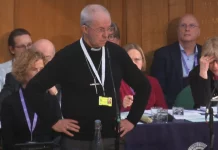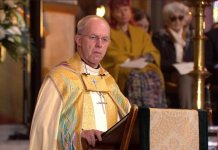The Bishop is the Pastor Pastorum (pastor of the pastors), the Chief Pastor, and the one to whom all the other pastors swear allegiance ‘in all things lawful and canonical’.
Our parish church is not an independent church (as much as we may sometimes like to think we are) but a church which is under the Bishop’s authority.
The Bishop makes appointments and bars appointments:
all clergy operate under his licence and no member of the clergy can operate without it. The Bishop is also in charge of discipline, as evident in the Ordinal:
WILL you maintain and set forward (as much as shall lie in you) quietness, peace, and love among all men; and such as be unquiet, disobedient and criminous within your Diocese, correct and punish, according to such authority as ye have by God’s Word, and as to you shall be committed by the Ordinance of this Realm?
Answer. I will so do, by the help of God.
The collect at the beginning of the consecration of a Bishop teaches us what a bishop is to do:
ALMIGHTY God, who by thy Son Jesus Christ didst give to thy holy Apostles many excellent gifts, and didst charge them to feed thy flock: Give grace, we beseech thee, to all Bishops, the Pastors of thy Church, that they may diligently preach thy Word, and duly administer the godly discipline thereof; and grant to the people, that they may obediently follow the same; that all may receive the crown of everlasting glory; through Jesus Christ our Lord. Amen.
The duties of his office are first put positively:
WILL you then faithfully exercise yourself in the same holy Scriptures, and call upon God by prayer, for the true understanding of the same; so as ye may be able by them to teach and exhort with wholesome doctrine, and to withstand and convince the gainsayers?
Answer. I will so do, by the help of God.
Then his duty is is put negatively, in terms of refuting error:
BE you ready, with all faithful diligence, to banish and drive away all erroneous and strange doctrine contrary to God’s Word; and both privately and openly to call upon and encourage others to the same?
Answer. I am ready, the Lord being my helper.
It is easy to set aside the 1662 Ordinal or act as if it is of merely antiquarian interest, but it is the gold standard for Anglican ministry. If we act as if it does not matter we may as well not be Anglicans. It is the Ordinal that defines and shapes Anglican ministry permanently and the canons of the church recognize it as such.
The Bishop has come out publicly in favour of blessing relationships which the Word of God says is sinful. He has published this to diocesan synod which is the governmental body for the whole diocese. So he is not driving away error but actually actively propagating it widely and publicly. Hence this response is a public one.
This error is not a minor error but one that the word of God says leads people to hell: The apostle Paul writes in 1st Corinthians:
“Or do you not know that wrongdoers will not inherit the kingdom of God? Do not be deceived: Neither the sexually immoral nor idolaters nor adulterers nor men who have sex with men nor thieves nor the greedy nor drunkards nor slanderers nor swindlers will inherit the kingdom of God.” (I Cor 6: 9-10)
1 Timothy 1: 9-10 says that homosexual practice is contrary to sound doctrine that conforms with the gospel :
9 We also know that the law is made not for the righteous but for lawbreakers and rebels, the ungodly and sinful, the unholy and irreligious, for those who kill their fathers or mothers, for murderers, 10 for the sexually immoral, for those practicing homosexuality, for slave traders and liars and perjurers—and for whatever else is contrary to the sound doctrine 11 that conforms to the gospel concerning the glory of the blessed God, which he entrusted to me.
In other words it is an ungodly lifestyle which should be repented of, not blessed.
The teaching of the Bishop places parishes in an impossible situation. They are spiritually overseen by someone who has abandoned apostolic ethics and the gospel (for apostolic ethics is a natural outflowing of the gospel of repentance and call to godliness). The ‘inclusive’ gospel is another gospel, no gospel at all, because it does not include repentance, it redefines sin.
In a letter a few years ago to a PCC, the Bishop made clear that he saw himself as responsible for parishes but not accountable to them. He reiterated that position in an answer to a question put recently at Diocesan Synod: that if parishes reduced parish share in protest over same sex innovations, it would be the case that clergy posts would be cut rather than the Bishop leave.
The apostle Paul has this instruction:
14 Do not be yoked together with unbelievers. For what do righteousness and wickedness have in common? Or what fellowship can light have with darkness? 15 What harmony is there between Christ and Belial[b]? Or what does a believer have in common with an unbeliever? 16 What agreement is there between the temple of God and idols? For we are the temple of the living God. As God has said:
“I will live with them
and walk among them,
and I will be their God,
and they will be my people.”[c]
17 Therefore,
“Come out from them
and be separate,
says the Lord.
Touch no unclean thing,
and I will receive you.”[d]
18 And,
“I will be a Father to you,
and you will be my sons and daughters,
says the Lord Almighty.” (2 Cor 6: 14-18)
Why is there a need to separate? Because of the very real danger of false teaching. It spreads, pollutes and defiles. We underestimate this at our peril. Many have already been infected, including some in our own congregation who have already believed the lie about sexual ethics.
In his own day, the apostle Paul called out individuals who were teaching error:
17 Their teaching will spread like gangrene. Among them are Hymenaeus and Philetus, 18 who have departed from the truth … (2 Timothy 2:17-18a)
Many years ago, as a young Rector, I was called to minister to a man who tragically got gangrene in his leg. I visited him more than once in hospital. The hospital were pumping him full of drugs to try to save the leg.
In the end, as I feared, the leg had to be amputated.
Thankfully he then became well, came home and lived a healthy life, which at the age of 79 was no mean feat, living alone with one leg !
But without amputation there was no prospect of recovery; he would have experienced a long slow agonizing death, as the gangrene took over his whole body.
So it is with the church when gross error is in charge.
A deadly condition requires radical treatment to save the rest of the body.
Unless the Bishop does repent, it does seem as though this is the time for churches to separate.
That need not be precipitate: plans would need to be made for alternative venues, the financial support of clergy leaders and so on, but churches would need to be on a departure track. To fail to plan is to plan to fail.
—
The author is a long standing incumbent of Southwark Diocese.










